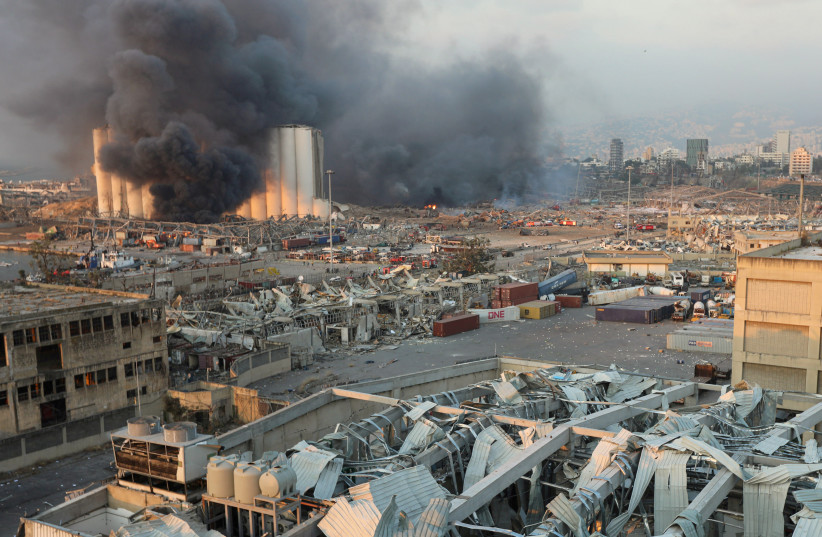by Yonah Jeremy Bob
The Beirut explosion and maritime deal struck between Israel and Lebanon are shifting views of Hezbollah within the country.

Multiple ex-IDF intelligence officials put out a report through INSS (Institute for National Securities Studies) on Tuesday flagging multiple historic and unique opportunities Israel has at this moment to alter how Hezbollah is perceived in Lebanon and worldwide.
The report was authored by former IDF intelligence officers Lt.-Col. (res.) David Siman-Tov and Lt.-Col. (res.) and National Security Council official Orna Mizrahi as well as former Prime Minister’s Office counter-terror official Yoram Schweitzer.
According to the report, “the political-cognitive struggle is part of the campaign waged by Israel designed to weaken Hezbollah and restrain its activity against Israel.”
“Israel’s cognitive campaign aims to influence the Lebanese population, thereby increasing the pressure on the organization; international public opinion; Arab countries; and Hezbollah’s leadership,” said the authors.
Two key events that the report drew on to say that Israel might actually have a much bigger opening for progress than in any time in recent memory were the recent disastrous explosions in Lebanon, which many blamed on Hezbollah, and the newly announced negotiations between Lebanon and Israel over sharing maritime resources.
Because of the current large-scale criticism of Hezbollah in Lebanon, the report said that, Hezbollah leader Hassan Nasrallah “is particularly sensitive to allegations that his organization is endangering civilians in Lebanon by using them as human shields while storing explosives in civilian environments, thereby creating a ticking bomb.”
This criticism spiked following the deadly explosion at the Beirut Port on August 4, in which about 200 people were killed and large portions of the city were decimated.
Additional explosions on September 22, October 9 and October 10 heightened the general feeling of anxiety in Beirut.
The current stage of the cognitive campaign to delegitimize Hezbollah has featured Prime Minister Netanyahu’s UN speech exposing Hezbollah’s weapons stockpiles in the midst of the civilian population in the heart of Beirut and the organization’s attempts to deny it that same evening.
Hezbollah immediately responded to Netanyahu’s speech with a tour of one of the sites in order to disprove the accusations, claiming that the missile factory was actually a civilian workshop.
However, the report said that, “The IDF subsequently used photographs taken during the tour of the plant to prove that the equipment in the workshop was used to manufacture missiles, and also identified the ‘factory manager’ as a member of Hezbollah.”
Outgoing IDF intelligence analysis chief Brig.-Gen. Doron Shalom recently told Yediot Ahronot that the event greatly embarrassed Hezbollah, and demonstrated Israel’s intelligence superiority.
The other major component helping Israel’s efforts regarding Hezbollah is that negotiations on marking the maritime border between Lebanon and Israel have begun, following the collapse of Lebanon’s economic, political, and health systems.
All of this takes place in the shadow of the coronavirus crisis which has hit most countries, but has brought Lebanon to its knees socio-economically to an even greater degree.
The maritime negotiations “gives Israel an opportunity to deliver positive messages about the expected advantages for Lebanon and its citizens if they abandon the belligerence dictated by Hezbollah, which is also driven by foreign interests, in favor of political and economic dialogue aimed at solving maritime and land territorial disputes.”
Hezbollah has tried to downplay the negotiations as being narrow and practical, fearful of any implication of momentum toward normalizing with Israel.
Israel has had some recent success in convincing other countries that Hezbollah is involved in an international terror network.
The report noted that Germany recently joined the UK, Netherlands, United States, and other countries in Latin America and the Gulf in classifying Hezbollah as a terrorist organization.
Israel is working to convince the EU to adopt the same position.
The report said that, “A trend in this direction is underway also in France, which until now has refrained from classifying Hezbollah as a terrorist organization because of its traditional ties with Lebanon.”
Further, it noted that on September 27, French President Emmanuel Macron criticized Hezbollah for being a partner in preventing the formation of a new government in Lebanon, and declared that the group “could not simultaneously be both an army and a political party.”
On the other hand, in recent years France has avoided major diplomatic showdowns.
The report admitted that, “Israel’s efforts to influence the Lebanese population have achieved only partial success. It is particularly difficult to sway the Shi’ite population, which is loyal to Hezbollah.”
“But other parts of the general population, which have been affected by Israel’s military operations in Lebanon, are also firmly opposed to Israel’s messages, and continue to regard Israel as an enemy responsible for their suffering,” said the report.
The authors wrote that despite those difficulties, “the cognitive campaign by Israel in Lebanon in general, and especially against Hezbollah, is now increasingly important.”
The report concluded that, “The difficult situation in Lebanon is likely to result in a more favorable response among a Lebanese public bearing the brunt of the crisis to the message that Hezbollah is one of the main parties to blame.”
Yonah Jeremy Bob
Source: https://www.jpost.com/middle-east/israel-has-unique-opportunity-to-change-perceptions-of-hezbollah-report-646349
Follow Middle East and Terrorism on Twitter
No comments:
Post a Comment